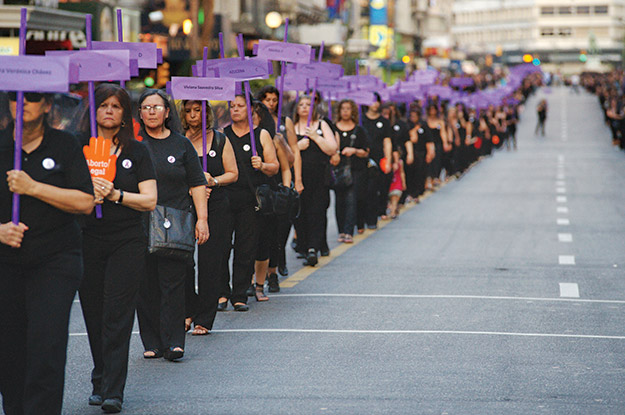This article is adapted from AQ’s most recent issue, “Fixing Brazil.” To receive the print edition at home, subscribe here.
A small country sandwiched between larger neighbors has claimed the number-one spot in Americas Quarterly Social Inclusion Index TM — for the third year in a row. So, what does Uruguay keep getting right?
Simply put, the country does a better job than its peers of protecting people regardless of their gender, sexual orientation or race. Uruguay’s progressive laws, such as marriage equality passed in 2013, help — but they’re not the only factor. Uruguayans themselves place huge importance on inclusion, and their country’s position in the ranking is also boosted by robust access to housing, job generation and economic growth.
Uruguay enjoys a “profound respect for the rule of law and a strong democratic tradition, (which) create a breeding ground for promoting individuality and equality for all,” Michelle Suárez Bértora, a Uruguayan lawyer, activist and the country’s first transgender person elected to office, told AQ.
Meanwhile, many countries in the Index continue to struggle. Those in Central America’s Northern Triangle — El Salvador, Honduras and Guatemala — as well as Nicaragua lack protection of basic rights and access to jobs and housing, while still combatting high poverty rates and low economic growth. Distinct histories and daily realities beg the question of whether comparing a country such as Uruguay with a country like Honduras is a fair exercise.
We believe the answer is yes. Now in its fifth year, the Index creates another benchmark for the region that goes beyond just GDP growth. We also hope the Index can serve as a guide to policymakers, multi-lateral agencies and others working to promote inclusionary policies and target vulnerable populations, as well as measure the impact of policies that are in place.
Based on what we know from Uruguay and other countries near the top of the Index, here are some strategies to help their peers to catch up.
Support the lesbian, gay, bisexual, and transgender (LGBT) community.
There is a growing understanding throughout Latin America — and the world — that LGBT rights are human rights, and are crucial for development and social equality. While pro-LGBT momentum is rising in the region, Uruguay has been a leader in this field. In 2013, Uruguay passed same-sex marriage laws with a large majority, and prior, in 2009, was the first in the region to legalize adoption rights for same-sex couples and pass progressive gender identity laws allowing transgender people to reflect their gender of choice on all official documents.
Empower women.
From health to politics, Uruguay has increasingly supported women’s rights. It is the only country in our Index that allows for full reproductive rights for women, after decriminalizing abortion in 2012. While many countries in the region boast high numbers of women in political power and quota laws to support women in legislative positions, such as Argentina, Chile and Nicaragua, this does not directly translate to increased protection for reproductive rights. However, the tide could slowly be turning, as evidenced by Chile, where President Michelle Bachelet has followed through on a campaign promise to introduce legislation that ends the country’s ban on abortion. And while abortion is illegal in many countries across the region, it doesn’t mean that women are not getting them — a topic brought to the forefront as the Zika epidemic surged across Latin America.
Secure access to a job and housing, across race and gender.
A steady source of income and adequate housing are crucial components for a stable livelihood and the backbone for living above the poverty line. Uruguay, along with Chile and Brazil, lead the region in providing employment oppotunities as well as access to housing with water and electricity.
Support political and civil rights.
Uruguay’s progressive policies under former President José Mujica and current President Tabaré Vázquez have thrived in a country that respects political and civil rights. The country enjoys an open and competitive multiparty system, low levels of corruption, and freedom of expression and religion. This allows Uruguayans to trust their political system as well as their protection of civil rights. Chile and Costa Rica join Uruguay in the top third of the rankings.
Meanwhile, there is always room for improvement, even for the country on top. While Uruguay leads the region in many variables, there are noticeable gaps in areas such as ethnoracial inclusion, where it falls squarely in the middle of the rankings in relation to its regional peers.
With an estimated 8 percent of the population identifying as Afro-Uruguayan — and a far lower percentage represented in government positions — Afro and indigenous rights are playing catch-up in an otherwise progressive country. Although laws were passed over the past decade to combat discrimination, there is still work to be done on their implementation. “Cultural prejudices and institutional racism create a barrier between the political will of the current government and the administrative body responsible for delivering services created for inclusion,” Afro-Uruguayan activist and Montevideo’s executive coordinator of ethnic, racial and migrant equality, Beatriz Santos Arrascaeta, told AQ.
—
Tummino is senior editor of AQ and senior director of policy at AS/COA
Bintrim is production editor of AQ and policy associate at AS/COA




